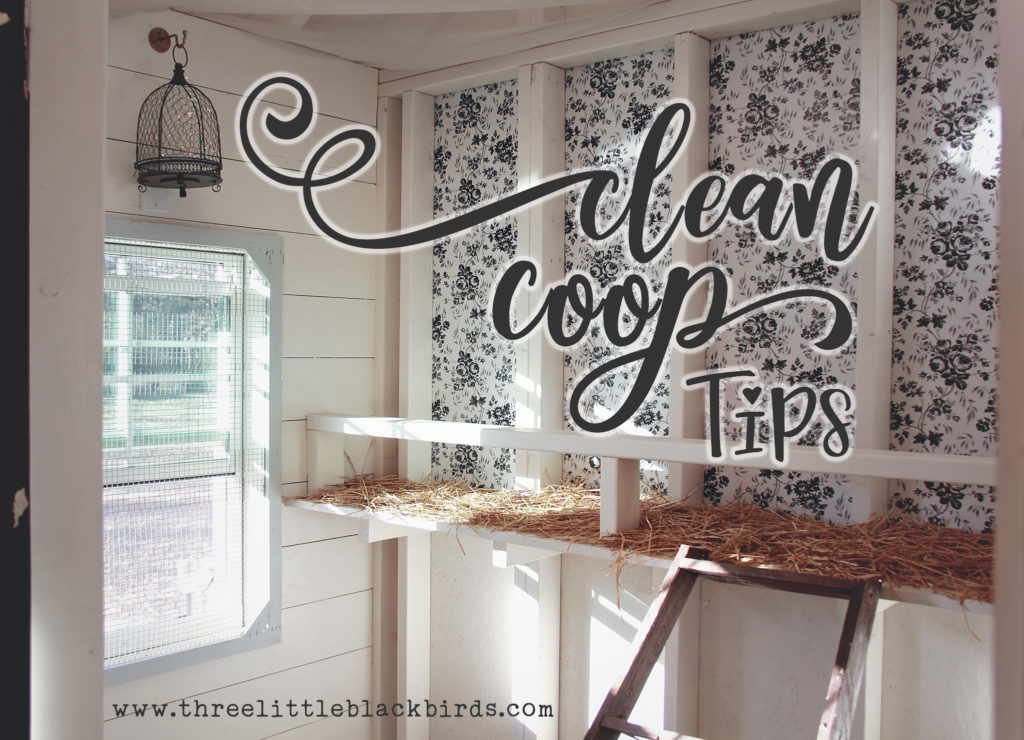
One of the questions I get asked the most is, “How do you keep your coop so clean!?” to which I usually kind of giggle and shrug off because well, my coop gets dirty just like any coop does and with it being all white – the dirt, the dust, the poop really shows. I mean…animals DO live in there after all. Animals, that poop…a lot. I do, however, have a few cleaning routines that I put into practice that help to keep it inviting in the coop, for humans and for the chickens that live there.
Some of the chores I do on a daily basis, which is just maintenance types of things. These chores needn’t be too involved or time consuming because who wants to spend hours per day cleaning a coop? No one. That’s who. But if you can spend just about 10 minutes each day, the weekly and monthly chores will be much less work.
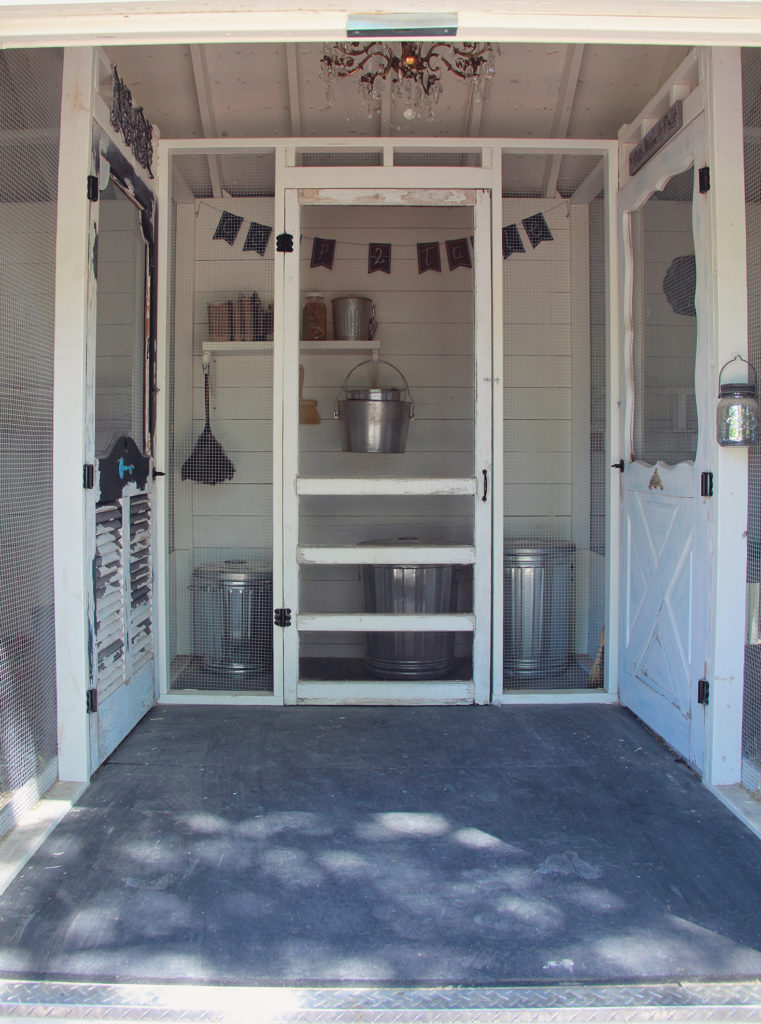
WHY CLEAN THE COOP AT ALL?
I hear it all of the time, “They’re just chickens,” “They’re animals, they don’t need a spotless coop,” “real coops are dirty!”
Yes, ALL coops are dirty and no, chickens don’t need a spotless coop. But they do need a clean living environment just like all pets/animals do. If you have horses, you muck out their stalls and sweep up the barn. Same with goats. You clean up after your dog and pick up their poop. You scoop cat boxes and fill with fresh litter. Why? Because we all know that a clean and tidy living environment for our pets is essential for keeping them healthy. Why should chickens be any different? And chickens ARE different.
CHICKENS ARE DIFFERENT THAN OUR OTHER PETS
Chickens have very fickle and delicate immune systems. They are extremely susceptible to bacteria and parasites in their environment. We seem to think that chickens are very hardy and aren’t bothered by filthy, smelly coops and then are shocked when chickens just start dying and we find bodies under the roosts. Spending a little time each day to tidy up the coop or taking measures to boost our chicken’s immune systems seems silly and frivolous, until we remember that we actually consume the products that come out of a chickens rear end. The same products that lay in a nest touched by whatever that chicken has been stepping on. A clean coop and clean nesting boxes aren’t just for the chickens, it actually benefits us too. If dogs and cats provided our breakfast everyday, can you imagine how clean we would want them to be?
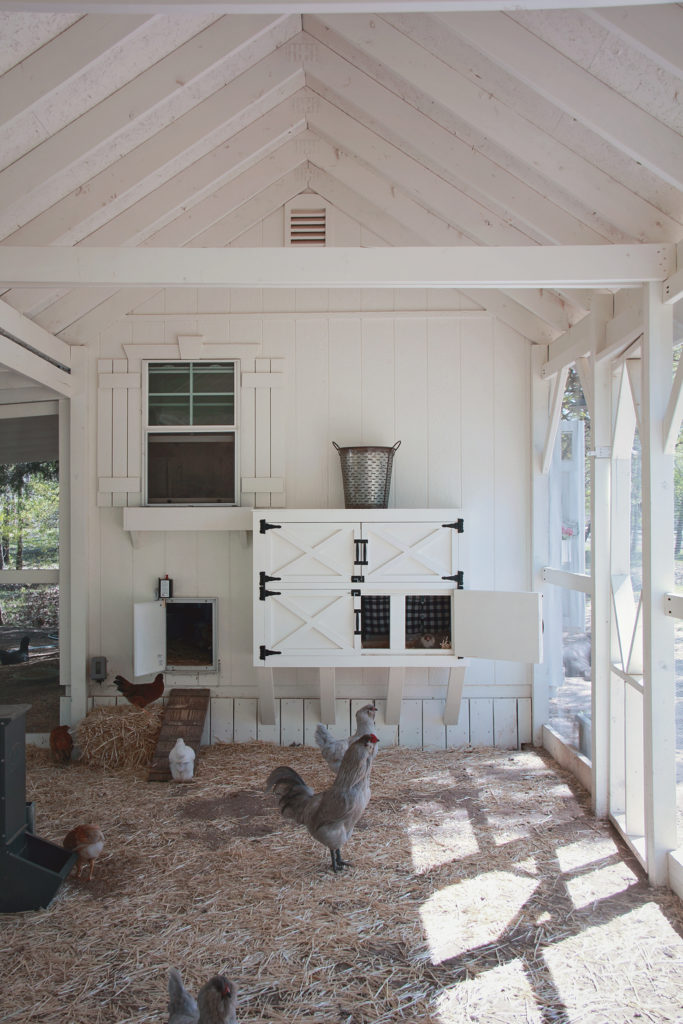
THE DIRTY COOP CULPRITS
So we’ve established that coops can be dirty places and most of the time we keep them closed up tight to protect the chickens from predators. We also tend to keep too many chickens in too small of coops, which presents its own share of problems. But the three main culprits to an unhealthy coop environment are dust, parasites, and of course the obvious, poop.
-Dust
Even though chickens take baths in dirt everyday (ideally) they are ironically sensitive to too much dust in their living environments, which can cause them respiratory distress. Every chicken keeper at some point has entered their coop, confronted by an inch of dust covering everything, and wondered…where does all this dust come from?? It’s stuffy, dusty and hard to breath. You immediately have to cough and are blinking the dust particles out of your eyes. You do whatever you came in there to do quickly and get out to the fresh air as soon as humanly possible. It seems obvious that having lots of animals in a small space together that literally bathe in dust and dirt all day long would bring lots of dust inside their coop. But, it doesn’t just come from the chickens themselves. Whatever floor bedding you use in your coop, from straw to shavings to hay to sand, is dusty in nature. Then add the chickens scratching at that bedding, throwing it around the coop with their claws whenever they are bored or looking for something tasty to eat under there. If you keep chicken feed inside your coop, that too can contribute to dust. All these things put together and it’s a perfect recipe for dust and lots of it. Not the best breathing environment for you or your beloved chickens.
-Parasites
Let’s get one unfortunate truth out of the way. All chickens have parasites. Did you read that correctly? ALL. CHICKENS. HAVE. PARASITES. If your chickens free-range during the day, if they are pasture raised, if you raise them organically – outdoors – in the fresh air and sunshine the way nature intended…they will have MORE parasites than the poor, caged, factory farmed chickens. It is an unpleasant truth but it doesn’t mean that all is lost. The key to combatting both internal and external parasites is first and foremost a healthy robust immune system and secondly, a clean and tidy environment in which your chickens reside. Most modern chickens roaming around back yards and pastures today, are carrying worms inside their gut and hosting lice and mites on their bodies. This sounds horrifying, but in reality, it doesn’t really bother the chickens or cause them significant harm until the parasitic load becomes heavy enough to be noticed by us. This is a sign that the chicken’s immune system and the parasites have gone to battle and the parasites have won. I’m talking about missing feathers around their vents, pale combs, piles of spaghetti like worms in their droppings, dry lumpy legs with scales lifting off the legs and feet, weak and lethargic behavior, and yes sometimes even…death.
If you find that your chickens have developed lesions or scabbing on their legs, there’s a chance that they may be afflicted by chicken mites. Check the coop, nest boxes, and bedding for signs of mites. You may need to utilize a flashlight and a magnifying glass to really see these tiny pests. Luckily, there are a variety of treatments available to rid your flock of mites, but one of the best ways to eliminate mites is to prevent them from appearing in the first place. Proper coop management and cleaning practices can prevent chicken mites from appearing and is a good way to stop the spread of disease. To learn more about chicken mites, check out this article.
-Poop
Poop happens. Yes it does. Is it a coincidence that poop rhymes with coop? I think not. Now let’s think logically about when chickens are in the coop and when they poop. If you have a run, or any sort of outdoor area for your flock, chances are that the chickens are only inside the actual coop to do two things. Lay eggs and sleep. Let’s not discuss the laying eggs part because if I know hens, they go in the coop, they lay their egg, they get out of the coop. The caveat to this scenario is IF you keep your food and water inside the coop, which is a no no – don’t do this. You are basically asking for rodents and mold to live in your coop full time. The other reason for being in the coop is of course to roost or sleep. Chickens do most of their pooping during the night. And what if you could contain all that poop and then scoop it away the next day leaving the floors below your roosts…clean! Well you can, with dropping boards! (if you live in a very cold environment and use the deep litter method of keeping your flock warm in the Winter, you can skip this part)
THE CLEAN COOP HELPERS
Some of my favorite things for a tidy coop is anything I can use or install to allow me to quickly and efficiently get the job done. I don’t want to spend hours cleaning the coop, so I like to use the “work smarter not harder” philosophy with my coop design and implementations.
-For the Poop
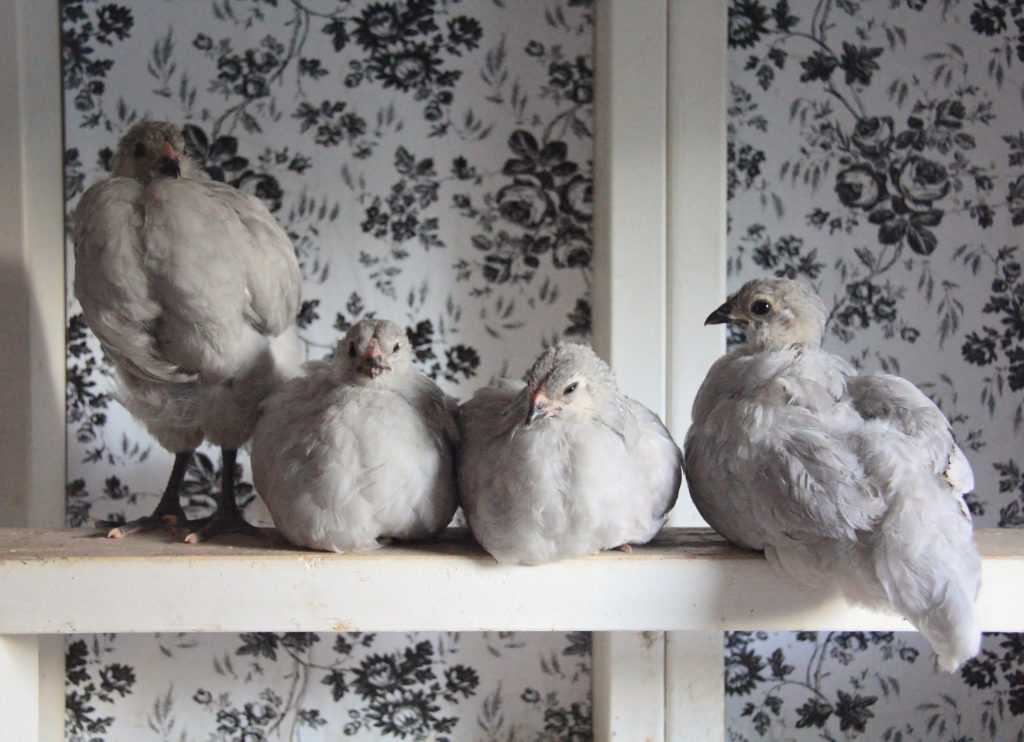
- DROPPING BOARDS: boards installed horizontally under the roosts, extending from the wall out past the roosts (about 5-6 inches past or however much room you have to play with). Extending the boards past the roosts, will catch any droppings whether your chickens roost backwards or forwards. As the birds roost and sleep, their droppings will fall onto the boards underneath rather than onto the floor of the coop. This allows you to scrape the poop into a bucket and then use the droppings for compost, etc.
- BENCH SCRAPER & BUCKET: I use a sturdy plastic bench scraper (the same type you would use in the kitchen to scrape flour off of a counter – such as when making a pie) and a regular old galvanized metal farm bucket (any bucket will do). I use a plastic scraper for the everyday clean ups rather than a metal one so it doesn’t scrape the paint off of my roosts and dropping boards. For really stuck on or dried up messes, I also use a small metal scraper when needed.
- KITTY LITTER SCOOPER: One of my favorite tools for cleaning up the area of the runs that are dirt and sand (such as my dirt bathing areas) is a good old kitty litter scooper. Use it just like you would to clean a cat box, scoop then shake to eliminate the poop from the dirt, then toss into your compost bucket.
- DESIGNATED SPONGE & SPRAY: I keep a good sturdy sponge out in my coop area (so it can’t be used for anything else) for quick cleanups. For splattered walls or roosts, if you wipe it up right away it prevents having to scrub it later. I also keep a spray bottle of my favorite natural cleaner which is just white vinegar with orange peels and lavender added.
- PRESSURE SPRAYER: Our roosts were designed to be easily removable. They are secured from the top with screws into the support beams below so that all I have to do is take my drill out to the coop, unscrew a few screws and my roosting boards lift up and out of the coop. This allows me to get to those hard to reach places and simply pressure spray the whole thing clean. Once dry, I just re-attach the boards and they stay clean-ish for a few months. One word of caution: If your roosts are painted, pressure spraying them might remove some of the paint. Ours are primed with several coats of primer and then painted with paint+primer and sealed but some tiny flakes of paint still chip off every time I pressure spray them. We are looking into replacing our wooden roosts with white pvc boards instead which would eliminate that problem.
- CONTACT PAPER: Looks pretty as wallpaper, but actually serves a purpose! Painted textured walls are hard to clean! And splattered poo is not fun to scrub. This contact paper allows for super easy clean up (with just the wipe of a damp sponge). This is the same contact paper you would use in kitchen drawers or cabinets and you can purchase it at just about any big box store. We got ours on Amazon.
-For the Dust
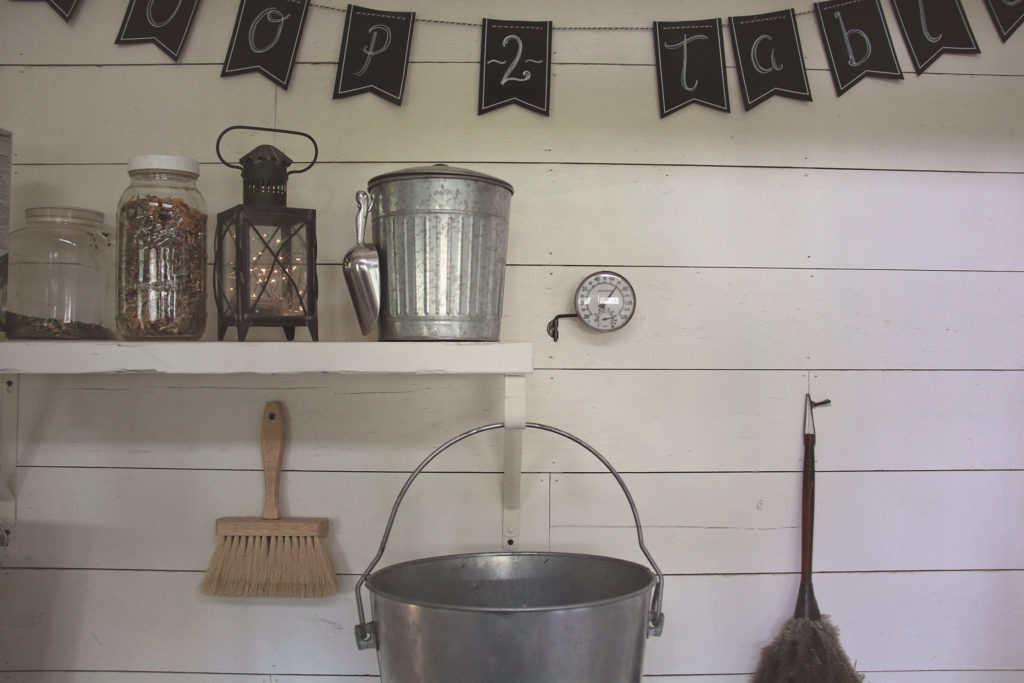
- OSTRICH FEATHER DUSTER: The Ostrich feather can absorb more dust than any other feather. If you’re lucky enough to come across a feather duster made with Ostrich feathers, they are amazing for small spaces. Rather than just moving dust around, they actually absorb it all until you can shake it outside to remove the dust. We found our South African duster in a small boutique style store in Mckinney Texas, but if you can’t find one, any regular feather duster will do. I use this to dust the chandelier, the items inside the storage area and the doors and windows.
- SMALL SHOP-VAC: I have a small 2.5 gallon wet/dry vacuum that’s just small enough to store in my storage area but big enough to not have to be emptied every day. I use this mostly to vacuum the air conditioner filter (which can get quite dusty), but also to easily vacuum up feathers and down and fine dust that’s gathered on the ground or other surfaces.
- AIR KING FANS: We have two mountable air king fans installed on the sides of each coop near the ceiling. They point out and down slightly and are high enough to not blow the bedding on the floor of the coop around. They do a great job of moving the air inside the coop, which keeps it much cooler inside and also helps to push any dust and feathers flying around to the floor, where it can be swept up. The constant air flow also helps to deter flies and wasps from entering the coop.
- BROOM: The obvious choice for sweeping away any dust and feathers that have settled in the center walkway of our coop.
-For the Parasites
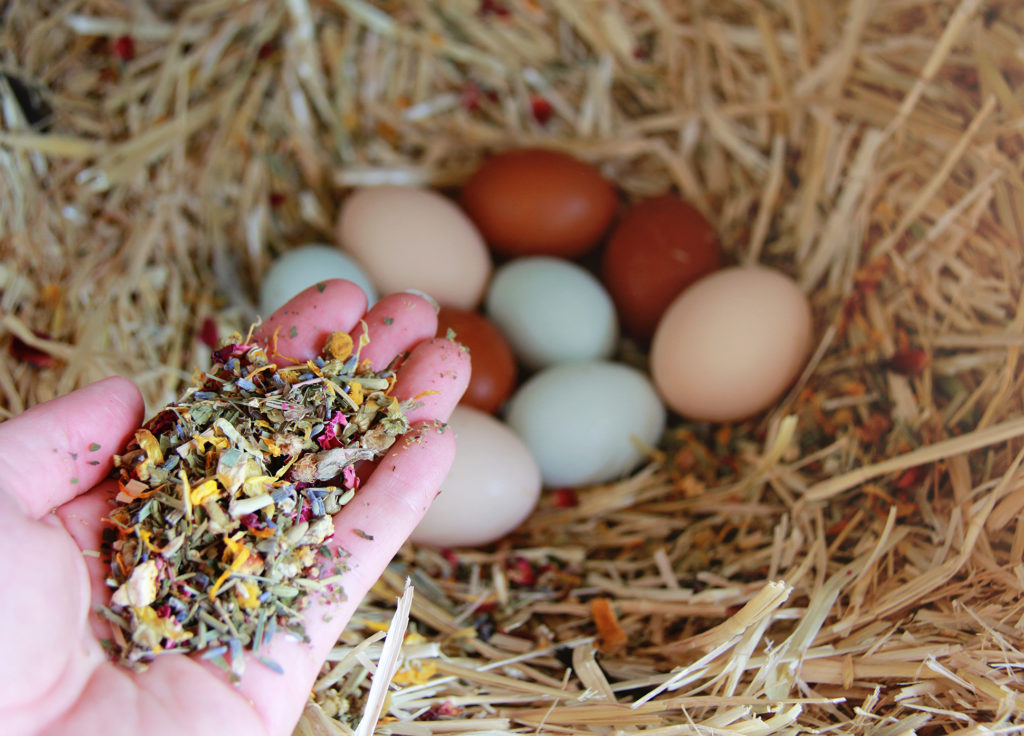
- FOOD-GRADE DE: Diatomaceous earth is a dust made from the fossilized remains of tiny, aquatic organisms called diatoms. Their skeletons are made of a natural substance called silica. DE causes insects to dry out and die by absorbing the oils and fats from the cuticle of the insect’s exoskeleton. Its sharp edges are abrasive, speeding up the process. It remains effective as long as it is kept dry and undisturbed. Dusting the bottom of nesting boxes, and any cracks and crevices in your coop and especially roosts, will ward off lice, mites, fleas, flies, ants, cockroaches, ticks and spiders.
- DRIED HERBS: I love dried herbs for a coop because they smell so amazing but they also really help to prevent parasites from taking over your coop. If you have an infestation of lice or mites, dried herbs won’t do much to combat it and you’ll be forced to use chemicals to get the problem under control – which is why prevention is key.
- FRESH HERBS: Bunches or bouquets of fresh herbs like mint, lavender, lemon balm, catnip, sage, rosemary and/or basil will not only look pretty dangling from the walls or ceiling of your coop, it will help to repel flies and mosquitoes.
- FLYTRAPS AND VANILLA AIR FRESHENERS: During the hot summer months when the flies are well…flying, we use flytraps in the runs to keep the fly population down. Flies are considered a parasite to chickens in that they can cause Fly Strike and they bring maggots. Maggots can be a great protein source for chickens but can also cause botulism, so it’s always a good idea to eliminate them as much as possible from your chicken’s environment. Vanilla scented air fresheners also have some magical ingredient in them that repels flies. If you figure out the unicorn magic, let me know!
CHORES LIST
As I mentioned before, some of the chores that I do in the coop are daily, but most of them are weekly and some are done once a month or even once every 3 months or so.
-Daily Chores
with gloves on…
- Scrape the poop from the dropping boards into my compost bucket. If there are any wet or sticky droppings, broken eggs or sometimes even ants on the roosts or the dropping boards (due to broken eggs), I will rub a very small amount of DE into the problem spots, then scrape the extra dust away into my compost bucket. BTW: DE in your compost will not hurt any of the good guys that you want in your compost, such as worms. etc.
- Pick up any droppings that have fallen on the floor and quickly straighten up the bedding, in our case…straw.
- Sweep the floor in the middle of the coop and in the storage area.
- Check nesting boxes for broken eggs or droppings
- Gather eggs from nesting boxes.
-Weekly Chores
- Dust the chandelier, feed containers, lights, outlets, etc. with a feather duster.
- Vacuum up any feathers and down stuck to the wire mesh walls or ceiling (our high powered fans cause them to get stuck in the wire sometimes)
- Add dried herbs to nesting boxes and sprinkle around the floor of the coops. Refresh any bedding in nesting boxes as needed.
- Clean runs and dust bathing areas, spread fresh straw as needed. Clean the ramps that the chickens use to get up into the coop.
-Monthly Chores
- Open up windows and clean both sides, dust all window wells and doors.
- Vacuum out fans, coop vents, ceiling beams, etc.
- Spray down surfaces with homemade spray that need it. Walls, roosts, nesting boxes, etc.
- If needed, pressure spray the roosts by removing the roosts from the coop and spraying them outside. Allow to dry completely.
- Sweep and mop the floor in the middle of the coops.
- Replace any fresh herbs in and around the coop.
-Once a Year Chores
- Remove all bedding from the floor of the coops and replace with fresh straw. I only have to do this once per year due to the small amount of cleaning and maintenance I do throughout the year.
- Repaint any surfaces that need touch ups.

The tips on the flies are especially helpful. I didn’t know they could get sick from the flies! I am a bit confused about your litter method. Are you on the deep litter method train? I guess not since you are picking up the poop with the kitty litter scooper.
The kitty litter scooper is used in our runs where we have dirt and sand. The bedding inside the coops is fresh straw. We definitely don’t use the deep litter method inside our coops, as we live in Texas.
Thank you!!
I love your recommendations! Regarding the paint, does it matter what kind of paint you use inside the coop? Do you sprinkle DE on the floor bottom before adding straw?
I want to highly recommend molly herbals formula 1 and 2 for maintaining a healthy chicken on the inside!
I use her herbal Formula 2 once a week and the herbal formula 1 for 3 days every six weeks to reduce the internal parasitic load and help create a strong immune system. It’s designed for all farm animals and she has tested the parasitic loads for her goats using these formulas with good success.
How wide are your poop boards? I love your setup.